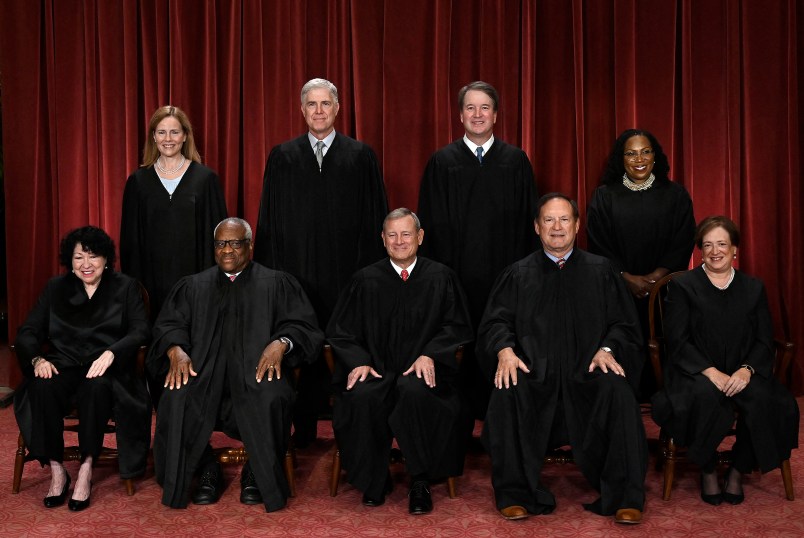A unanimous Supreme Court ruled Thursday that the anti-abortion doctor plaintiffs in a major mifepristone case lack standing to reimpose restrictions on the drug.
The case presented a major risk to the drug’s accessibility, as adding back restrictions that the Food and Drug Administration had previously lifted would apply nationwide, even in blue states with robust abortion rights.
The plaintiffs in the case — represented at oral argument by lawyer Erin Hawley, wife of Sen. Josh Hawley (R-MO) — contorted themselves to try to find some injury that the lifting of various restrictions on mifepristone caused them. They crafted hypotheticals about floods of suffering women being sent to their emergency rooms when they happened to be the only doctor on call; they complained that they had to spend money to drum up opposition to the FDA’s actions. But none of that, Kavanaugh wrote, passed muster.
“Federal courts do not operate as an open forum for citizens ‘to press general complaints about the way in which government goes about its business,’” he said.
Cutting through the plaintiffs’ many speculative theories of how they might, maybe, one day be harmed by the drug, Kavanaugh put it plainly: “Under Article III of the Constitution, a plaintiff’s desire to make a drug less available for others does not establish standing to sue.”
That idea — that the anti-abortion doctors’ desire for other doctors not to prescribe mifepristone and for patients not to take it simply does not give them grounds to sue — is both an obvious and basic facet of our legal system, and one that seemed to elude both U.S. District Judge Matthew Kacsmaryk and the 5th Circuit, both of whom granted the plaintiffs standing in their haste to restrict the abortion drug.
The Court also clearly couldn’t swallow the slippery slope of what granting standing on such tenuous grounds could mean. The floodgates would be opened to an unmanageable wave of litigation: Every doctor would suddenly get the right to sue the FDA for approving virtually any drug with side effects; others could file lawsuits whenever an official makes a change that could bring about new physical harms (lifting emissions regulations, starting a middle school football league, increasing speed limits, expanding gun rights, as Kavanaugh proposed in a series of hypotheticals).
“Firefighters could sue to object to relaxed building codes that increase fire risks,” he wrote. “Police officers could sue to challenge a government decision to legalize certain activities that are associated with increased crime. Teachers in border states could sue to challenge allegedly lax immigration policies that lead to overcrowded classrooms.”
As ever, Justice Clarence Thomas wrote in concurrence to nudge the decision further to the right: agreeing with the other justices that the anti-abortion doctors don’t have standing in this case, but also trying to seal off an avenue for abortion rights cases in the future (using language lifted from the anti-abortion movement to do so).
“Just as abortionists lack standing to assert the rights of their clients, doctors who oppose abortion cannot vicariously assert the rights of their patients,” he wrote.
Associational standing, the concept Thomas seeks to end, is often used by civil rights groups on behalf of individuals.
The Court’s decision was to some extent expected, and even the right-wing justices at oral argument couldn’t find a way to accept the plaintiffs’ tortured theory of standing. But it’s a major win for abortion rights nevertheless, showing that there are some limits to the shoddiness of the cases the conservatives will accept to further their ideological and policy aims.
That bare minimum adherence to basic legal principles, in this case, narrowed the pipeline that has proven so successful for right-wing litigants. The group behind the lawsuit — the Alliance for Hippocratic Medicine — was formed in Amarillo, Texas after Dobbs specifically so it could plant the lawsuit with reliably anti-abortion judge Kacsmaryk.
After Kacsmaryk granted the bulk of their requests, including revoking the FDA’s 20-plus year approval of mifepristone, the case, as intended, moved to the ultra-conservative 5th Circuit. The panel there grudgingly concluded that the statute of limitations to challenge the initial approval of the drug had passed, but gamely ordered the reimposition of more recent restrictions that the FDA had lifted after finding them to be both onerous for patients and medically unnecessary.
Judge James Ho, a 5th Circuit judge and one of the most infamous Trump appointees, tried out the mind-boggling argument that the anti-abortion doctors had suffered an “aesthetic injury,” which gave them standing.
“Unborn babies are a source of profound joy for those who view them. Expectant parents eagerly share ultrasound photos with loved ones,” he wrote. “Friends and family cheer at the sight of an unborn child. Doctors delight in working with their unborn patients — and experience an aesthetic injury when they are aborted.”
The decision is the latest slap on the wrist for the appellate court and Kacsmaryk, both of whom the Supreme Court has overturned with some frequency.







I guess we’re supposed to write thank you notes.
I’m writing my F—ck you for nothing note now.
It was an asinine argument in the first place:
"At some point in the future somebody might hurt my religious feelings, so now everyone else must bow down to my fucking doG.
Fuck Sam Alito. SCOTUS doesn’t want to touch that third rail, even if the GOP Christofascists do.
Should we be flying flags of support?